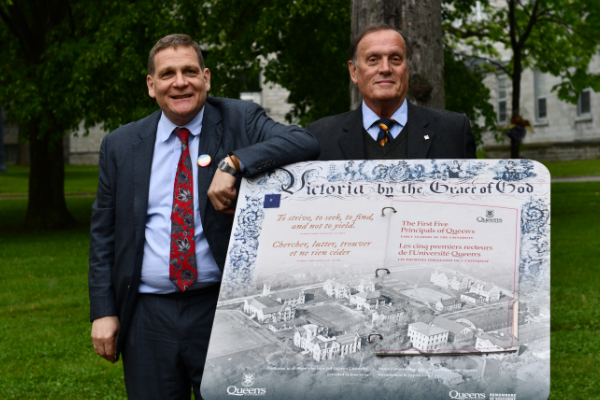Remembering the early years of Queen's
June 13, 2019
Share

People walking around the Queen’s campus will have a new way to feel more connected to the past of this historic institution now that Principal Daniel Woolf has unveiled the fourth installation of the Queen’s Remembers initiative. This new commemorative plinth in front of Summerhill tells the story of the first five principals of the university.
“While the principals who followed have received a great deal of recognition, the first five are relatively unsung heroes,” says Principal Woolf. “But they made formative contributions in a time of hardship and uncertainty for the university.”
Previous plinths have been dedicated to the Indigenous Peoples upon whose land Queen’s was built, the 5th Field Company, and the Nobel Prize-winning research discoveries led by Arthur B. McDonald.
As the eight-page book featured on this new plinth describes, the first five principals all had to take great pains to ensure the survival of Queen’s. When Reverend Thomas Liddell, the first principal, came to Kingston from Scotland in 1841, Queen’s was not much more than an idea in the Royal Charter that established it. Principal Liddell had to work hard to find both students and funds for the school, and it was not always clear that Queen’s would survive.
The four subsequent principals all faced their own difficulties but found ways to make important contributions to the school. Principal John Machar, for instance, presided over the university’s purchase of Summerhill, and Principal James George helped establish the Faculty of Medicine. Principal John Cook remains the only person to serve as both principal and chancellor of Queen’s. And Principal William Leitch oversaw the creation of the original Faculty of Law at the university while also leading Queen’s to take over management of the local observatory.
The plinth helps make the early years of Queen’s come alive for readers by sharing some colourful details about the early principals. In the page on Principal Leitch, for example, readers can learn that the fifth principal of Queen’s also wrote the first theoretical paper about the potential to use rockets to travel into space. Until recently, Jules Verne, the famous author of novels such as Around the World in Eighty Days, had been commonly credited as the first person to think of this kind of space travel. But Robert Godwin, a historian of space and a special guest at the unveiling, uncovered Leitch’s writing about rockets while conducting research for a biography. Mr. Godwin outlined his findings in the book William Leitch: Presbyterian Scientist and the Concept of Spaceflight, 1854-1864, which was published in 2015.
Christopher Markwell, another advocate for honouring the contributions of Principal William Leitch, was also present at the ceremony. Mr. Markwell is the Chair of the Baird of Bute Society on the Isle of Bute in Scotland, which is the birthplace of Principal Leitch. In 2017, the society posthumously awarded the Baird of Bute Innovation Award to Principal Leitch in recognition of his innovative ideas on rocket flight. Principal Woolf accepted the award on behalf of his predecessor in a ceremony held at Queen’s.
As Principal Woolf’s tenure as the twentieth principal of Queen’s draws to a close, he found it particularly meaningful to commemorate the first five people to hold the position. “These first five principals laid the foundation on which every subsequent principal has been able to build,” he says.
As with the three previous installations in the Queen’s Remembers initiative, this plinth offers people a meaningful way to engage with the campus and feel connected to the institution. Members of the campus community and visitors alike can use the plinths to put the campus in context and better understand the history of Queen’s.
“We have a beautiful and historic campus,” Principal Woolf says, “and I hope that these installations will help people enjoy the time they spend here, whether they come here every day or are passing through. I also hope that all of the plinths help people on campus appreciate the rich heritage of Queen’s.”